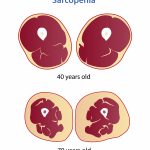
Sarcopenia, a term coined by Dr. Irwin Rosenberg in 1989, refers to the age-related loss of muscle mass and function. This condition significantly contributes to frailty, disability, and loss of independence in older adults. Sarcopenia affects approximately 10% of adults over 50 and increases with age.
The term “sarcopenia” is derived from the Greek language. It combines two Greek words: “sarx,” which means flesh or muscle, and “penia,” which means deficiency or poverty; thus, sarcopenia can be translated to English as “muscle deficiency” or “loss of muscle.” another popular translation is “poverty of flesh.” The term aptly describes the gradual decline in muscle mass and function that occurs as a result of the aging process.
Aging and longevity are closely linked to sarcopenia, as the condition results from a combination of factors that happen as we age. These include hormonal changes, decreased physical activity, and inadequate nutrition. Sarcopenia leads to a decline in muscle strength, which can impair mobility, increase the risk of falls, and ultimately reduce one’s quality of life. By addressing and managing sarcopenia, individuals can maintain more significant physical function and independence, promoting healthy aging and longevity.
Effective treatment plans for sarcopenia involve resistance training, aerobic exercise, and proper nutrition. Resistance training helps stimulate muscle growth, while aerobic exercise promotes overall health and cardiovascular function. Adequate protein intake and vitamins and minerals are essential for maintaining muscle mass and strength. In some cases, hormone replacement therapy or medications may be recommended to address underlying hormonal imbalances.
Below is the best YouTube video I found on the topic, describing Sarcopenia and how to prevent it.
Specific research on sarcopenia and longevity includes:
- A study by Cruz-Jentoft et al. (2010) established diagnostic criteria for sarcopenia and proposed interventions to prevent and treat the condition.
- Research by Morley et al. (2014) examined the role of hormones, nutrition, and exercise in the prevention and treatment of sarcopenia.
- A review by Beaudart et al. (2014) explored the relationship between sarcopenia and physical disability, falls, and mortality.
Books that discuss sarcopenia regarding longevity include:
- “Biomarkers of Human Aging” by Alexey Moskalev, explores the role of sarcopenia as a biomarker for aging.
- “Frailty and Sarcopenia in Cirrhosis” by Puneeta Tandon and Aldo J. Montano-Loza, discusses the impact of sarcopenia on the progression of liver disease and overall survival.
Several longevity supplements have been studied for their potential role in addressing sarcopenia. Some of the most promising candidates include:
- Creatine: This supplement is widely used by athletes to increase muscle strength and mass. Research suggests that creatine supplementation and resistance training may help older adults maintain or increase their muscle mass and improve overall physical function.
- Branched-chain amino acids (BCAAs): These essential amino acids are crucial in muscle protein synthesis. Supplementation with BCAAs, particularly leucine, has been shown to stimulate muscle protein synthesis in older adults, potentially helping to counteract sarcopenia.
- Vitamin D: Low vitamin D levels have been linked to decreased muscle strength and function in older adults. Supplementing with vitamin D may improve muscle strength and reduce the risk of falls in those with sarcopenia.
- Omega-3 fatty acids: In fish oil, omega-3 fatty acids have anti-inflammatory properties that may help preserve muscle mass and function. Some studies have shown that omega-3 supplementation can improve muscle strength and function in older adults, particularly when combined with exercise training.
- HMB (beta-hydroxy-beta-methyl-butyrate): This metabolite of the amino acid leucine has been shown to increase muscle mass and strength, particularly when combined with resistance training. HMB supplementation may help to prevent or slow the progression of sarcopenia in older adults.
It is important to note that while these supplements show promise in addressing sarcopenia, they should be used with a balanced diet, regular exercise, and under the guidance of a healthcare professional.
« Back to Glossary Index